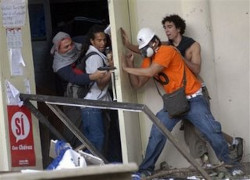Colectivo (Venezuela)
File:FILMADOS ASESINOS DE GENESIS CARMONA - GUERRA CIVIL EN VENEZUELA.webm File:Grupos pro-gubernamentales disparando durante protestas en Valencia, Venezuela 2014.webm thumb|left
File:Grupos pro-gubernamentales disparando durante protestas en Valencia, Venezuela 2014.webm Colectivo (Venezuela)
Colectivos are Venezuelan grassroots organizations that have been associated with the Bolivarian Revolution. These groups are often involved in community activities, political advocacy, and social programs. However, they have also been linked to violent actions and have been accused of acting as paramilitary groups supporting the United Socialist Party of Venezuela (PSUV).
History[edit | edit source]
The origins of colectivos can be traced back to the 1960s and 1970s, when leftist guerrilla movements were active in Venezuela. These groups evolved over time, particularly during the presidency of Hugo Chávez, who came to power in 1999. Chávez's government encouraged the formation of community organizations to promote social and political participation, which led to the proliferation of colectivos.
Functions and Activities[edit | edit source]
Colectivos engage in a variety of activities, including:
- Community development projects
- Political mobilization and advocacy
- Social services, such as education and healthcare
- Cultural events and programs
Some colectivos have also been involved in maintaining public order in their communities, often acting as a parallel force to the official Venezuelan National Police.
Controversies[edit | edit source]
Colectivos have been controversial due to their alleged involvement in violent activities and their close ties to the government. Critics argue that they operate as paramilitary groups, intimidating and attacking political opponents. There have been numerous reports of colectivos participating in violent crackdowns on anti-government protests, particularly during periods of political unrest.
Government Support[edit | edit source]
The Venezuelan government has been accused of providing financial and logistical support to colectivos. This support is seen as a way to maintain control over certain areas and to suppress dissent. The government, however, often portrays colectivos as vital community organizations that contribute to the social fabric of the country.
Notable Colectivos[edit | edit source]
Some of the most well-known colectivos include:
See Also[edit | edit source]
References[edit | edit source]
External Links[edit | edit source]
Search WikiMD
Ad.Tired of being Overweight? Try W8MD's physician weight loss program.
Semaglutide (Ozempic / Wegovy and Tirzepatide (Mounjaro / Zepbound) available.
Advertise on WikiMD
|
WikiMD's Wellness Encyclopedia |
| Let Food Be Thy Medicine Medicine Thy Food - Hippocrates |
Translate this page: - East Asian
中文,
日本,
한국어,
South Asian
हिन्दी,
தமிழ்,
తెలుగు,
Urdu,
ಕನ್ನಡ,
Southeast Asian
Indonesian,
Vietnamese,
Thai,
မြန်မာဘာသာ,
বাংলা
European
español,
Deutsch,
français,
Greek,
português do Brasil,
polski,
română,
русский,
Nederlands,
norsk,
svenska,
suomi,
Italian
Middle Eastern & African
عربى,
Turkish,
Persian,
Hebrew,
Afrikaans,
isiZulu,
Kiswahili,
Other
Bulgarian,
Hungarian,
Czech,
Swedish,
മലയാളം,
मराठी,
ਪੰਜਾਬੀ,
ગુજરાતી,
Portuguese,
Ukrainian
Medical Disclaimer: WikiMD is not a substitute for professional medical advice. The information on WikiMD is provided as an information resource only, may be incorrect, outdated or misleading, and is not to be used or relied on for any diagnostic or treatment purposes. Please consult your health care provider before making any healthcare decisions or for guidance about a specific medical condition. WikiMD expressly disclaims responsibility, and shall have no liability, for any damages, loss, injury, or liability whatsoever suffered as a result of your reliance on the information contained in this site. By visiting this site you agree to the foregoing terms and conditions, which may from time to time be changed or supplemented by WikiMD. If you do not agree to the foregoing terms and conditions, you should not enter or use this site. See full disclaimer.
Credits:Most images are courtesy of Wikimedia commons, and templates Wikipedia, licensed under CC BY SA or similar.
Contributors: Prab R. Tumpati, MD


